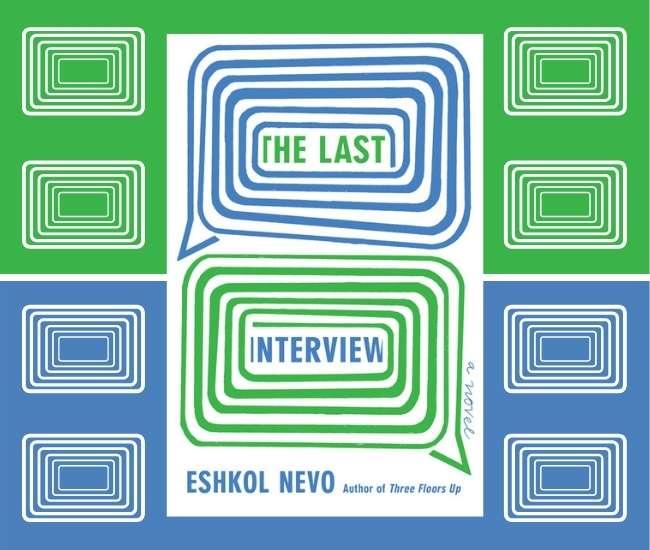Praise for Eshkol Nevo’s Three Floors Up
“Smart and absorbing … Nevo shows us life’s complexities in a thoroughly satisfying read.”
— Library Journal
“Eshkol Nevo is a fascinating storyteller who gives the reader a broad and diverse picture of Israeli society.”
— Amos Oz
—∞—
The Last Interview (Other Press), by the exceptionally insightful Eshkol Nevo, is a haunting investigation into the stories we tell ourselves and others, and how the stories we have lived become our realities and inform our futures.
The narrator walks a thin line between truth and lie, fiction and fact, often conflating the two, doubling back when he realizes that he may be harming those he loves in his desperate quest for his next great story. When your family and friends become characters, your most impactful life events become plot twists, and your personal guilt becomes internal conflict. What is to stop you from baring your soul to anyone who will read it? Apparently, nothing, since the unnamed protagonist decides to reply to a set of submitted interview questions with utmost honesty, even as it brings his own true history to light and reveals the deep fault lines in his relationships with family, friends and sense of self.
The protagonist is a well-regarded Israeli writer, mildly famous yet fiercely insecure. He is married and has three children, is university-educated and a veteran of the army, and sometimes tours to promote and speak about his latest work. All might seem peaceful and successful on the surface, but unhappiness hides beneath the facade.
A STRUGGLE TO HOLD ONTO FAMILY AND FRIENDS
He worries that he is losing everything he holds most dear — his marriage has grown detached and tense; his eldest child chose boarding school and thus left him feeling acutely betrayed; and of his old friends, one has been missing for years, and another is hospitalized with cancer. As for himself, he struggles with dysthymia, a mood disorder that leaves him in a perpetual depressive state, in addition to actual and fantasized infidelity and gnawing guilt around his various writings and their social and political influence.
He has a lot to unpack, and over the course of this series of interview questions he tells his story; not a story, not a bestseller, but the sometimes heartbreaking and always provocative account of a real life lived.
The protagonist certainly has his faults, and both he and the reader become increasingly aware of them as the interview progresses. A decidedly unreliable narrator, his answers do not always stick to the question at hand; sometimes his response seems almost irrelevant and evasive, though, as his context and personal history unfold, they all fall into place as crucial moments that have collectively determined his trajectory and choices.
His relationship with his wife Dikla slides under the microscope repeatedly in all its complications and nuance. The reader witnesses their first dates, their unconventional courtship and wedding, and their small discrepancies, which eventually pile up to create a gaping trench between them that seems nearly impossible to cross. Though he insists he still loves her, missed opportunities and poor decisions undermine his claims. Meanwhile, her coldness and resistance make his lame attempts at reparation seem futile.
Almost equally terrifying is his daughter Shira’s rejection of him and the looming death of his close friend Ari. It truly seems that everyone he loves has abandoned or will abandon him while he watches and waits, helpless and hurt.
THE FLAW IN EDITING YOUR LIVED EXPERIENCE
In his answers to each question, he continues to cling to his lifeline: writing. As everything around him slips away, he gets to keep his memories, releasing them and reckoning with them in the process of his storytelling.
But this interview isn’t just another book, another way for him to translate his personal life into fiction while simply switching out some names and dramatizing chance encounters. In this The Last Interview excels; Nevo the writer, composing a novel about a writer who confesses every difficult truth now that he has finally grown tired of stories and lies.
The layers cause readers to question how their own memories, self-deception and behavior in relationships have determined their current realities. What lies have we all told in order to feel that our stories are worth the telling, or our lives worthy of love? And how can we find redemption even in the eyes of that harshest of audiences — ourselves?
Photo by Moti Kikayon
About Eshkol Nevo:
Eshkol Nevo, born in Jerusalem in 1971, is one of Israel’s most successful living writers. His novels have all been bestsellers in Israel and published widely in translation. His novel Homesick was long-listed for the 2009 Independent Foreign Fiction Prize; World Cup Wishes was a finalist for the 2011 Kritikerpreis der Jury der Jungen Kritiker (Austria); Neuland was included in the Independent’s 2014 Books of the Year in Translation; and Three Floors Up (Other Press, 2017) will be adapted for film by the acclaimed Italian director Nanni Moretti in 2020. Nevo owns and co-manages the largest private creative writing school in Israel and is a mentor to many up-and-coming young Israeli writers.




